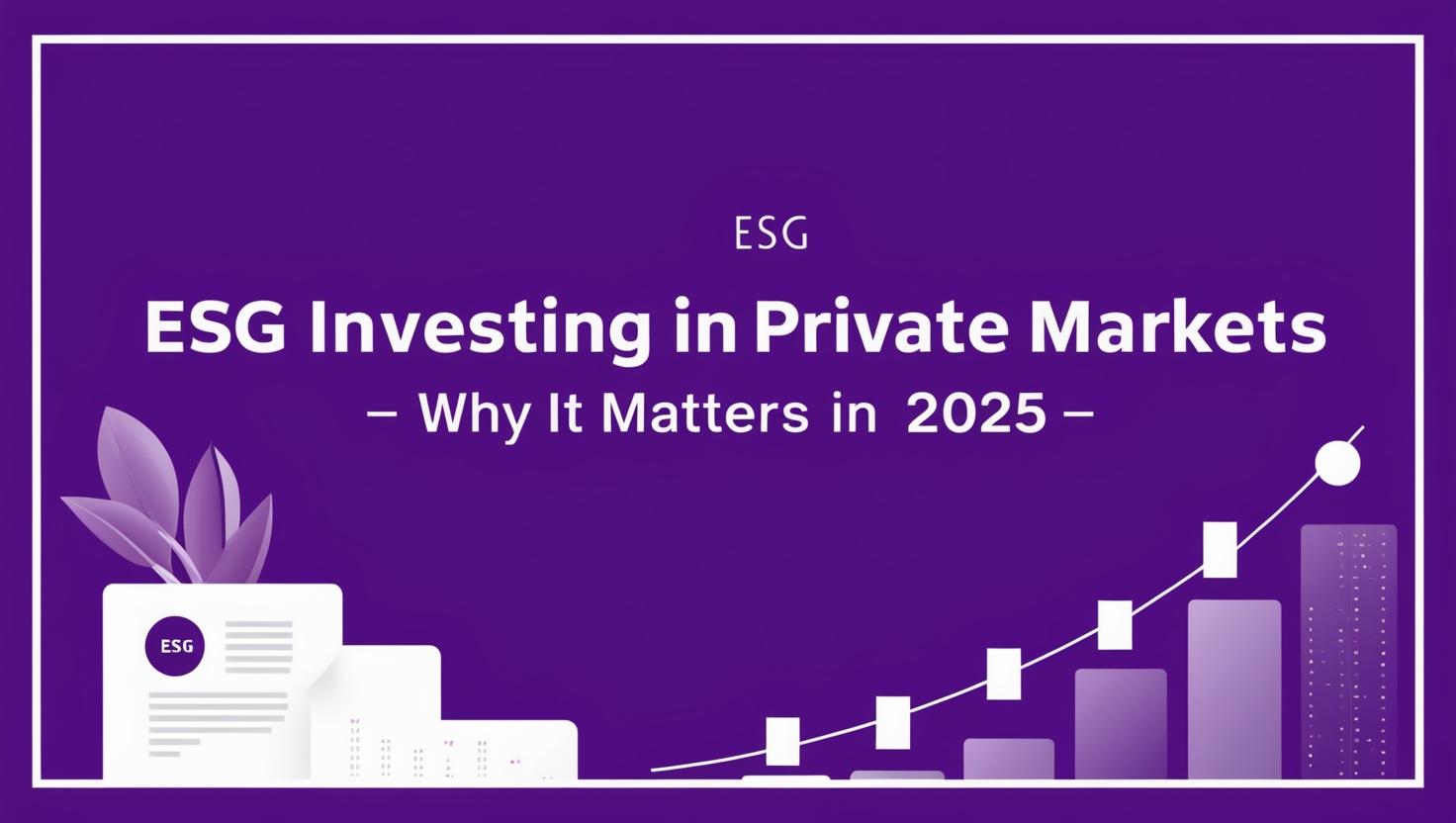
Best Sources for Private Company Valuation Multiples by Industry
The best sources for private company valuation multiples by industry, how investors use them, and key limitations in private market analysis.

ESG investing private markets is reshaping the global financial landscape. As sustainable investing becomes a top priority in 2025, investors seek strong returns with ethical impact. As the global economy becomes more interconnected, investors are increasingly looking to make decisions that not only deliver strong financial returns but also contribute positively to society. This is where ESG — Environmental, Social, and Governance — factors come into play.
ESG investing private markets is no longer a buzzword but a critical element in modern investment analysis. Investors are now prioritizing these factors to guide their capital allocation, and for good reason. In this post, we’ll dive into how ESG is shaping the investment world and why it’s more important than ever for private market investors.
ESG is no longer a buzzword but a critical element in modern investment analysis. Investors are now prioritizing these factors to guide their capital allocation, and for good reason. In this post, we’ll dive into how ESG is shaping the investment world and why it’s more important than ever for private market investors.
What is ESG?
Environmental factors assess a company’s impact on the planet. Investors are looking at aspects like carbon emissions, energy consumption, waste management, and how companies are tackling climate change. Companies with solid environmental practices are not just good for the planet; they’re also better equipped to handle climate-related risks.
Social factors explore how companies manage relationships with employees, suppliers, and customers, as well as their role in the community. Investors are increasingly valuing diversity, human rights, labor practices, and product safety, as these elements are linked to a company’s long-term success and reputation.
Governance looks at how a company is managed, including the quality of leadership, executive compensation, audits, and shareholder rights. Solid governance practices create stability, foster trust, and often lead to better financial outcomes.
Ignoring ESG risks can expose investors to major financial setbacks. Failing to comply with environmental regulations can lead to fines or disruptions, while poor social practices can tarnish a company’s brand. Governance failures may even lead to scandals that shake stock prices. By integrating ESG into the investment process, investors can better identify risks that could derail long-term returns.
ESG isn’t just about avoiding risks — it’s also about discovering opportunities. Companies that are leaders in sustainability tend to perform better over time, with greater innovation, efficiency, and long-term growth potential. Investors are increasingly drawn to firms that are proactively managing ESG risks and positioning themselves for success.
There’s a growing demand for socially responsible investments. Both institutional and retail investors are now more interested in aligning their portfolios with their values. As more clients push for ESG-conscious investments, advisors and fund managers are incorporating these factors into their analyses to meet client needs and expectations.
Research increasingly shows that companies with strong ESG practices deliver better financial outcomes. They tend to have lower operational costs, more efficient capital use, and less volatility. Firms that prioritize governance, employee well-being, and environmental responsibility are generally more resilient, making them well-positioned to navigate future challenges.
Despite growing momentum, ESG investing in private markets faces challenges around data standardization, transparency, and regulation.
As promising as ESG investing may be, it’s not without its challenges:
🔹 Changing Regulations: ESG regulations are still evolving. As governments introduce stricter sustainability laws, investors must stay updated on how these shifts could impact their portfolios.
ESG investing is now a core pillar of modern portfolio strategies — especially for private equity and institutional investors. Integrating ESG into investment analysis can help mitigate risks, uncover growth opportunities, and meet the demands of today’s conscientious investors.
For private market investors, ESG is not just a moral choice — it’s a financial one. By embracing ESG practices, investors position themselves for sustainable long-term success. The future of investing lies in sustainability, and those who adapt now will reap the benefits for years to come.
By focusing on companies that prioritize ESG, we can not only contribute to a better world but also secure stronger financial returns. ESG is no longer optional — it’s the key to thriving in the modern investment world
For a deeper look into ESG frameworks, visit UN Principles for Responsible Investment.
Book a free demo with DealPotential and get real-time insights on the next billion-dollar opportunities.
SHARE:

The best sources for private company valuation multiples by industry, how investors use them, and key limitations in private market analysis.

AI-driven due diligence software helps M&A teams assess companies earlier. DealPotential supports early-stage commercial due diligence.

Predict future M&A deals using early indicators and AI signals. Learn how DealPotential identifies acquisition-ready companies earlier.
We use cookies to improve your experience, analyze web traffic, deliver customized content, and support marketing efforts.
DealPotential Investment Intelligence Platform Proposal Agreement
WHEREAS, the Seller agrees to provide access to the DealPotential Investment Intelligence Platform,
WHEREAS, the Client agrees to purchase the DealPotential Investment Intelligence Platform according to the terms and conditions laid out in this contract.
THEREFORE, in consideration of the mutual agreement made by the parties hereto, the Seller and the Purchaser (individually, each a “Party” and collectively, the “Parties”) agree to the following:
2. Subscription: By subscribing to the Platform, you agree to pay the monthly or yearly subscription fee, as specified in your subscription plan.
3. Payment: Payment is due monthly in advance and processed via Stripe. The subscription renews automatically until cancelled.
4. Cancellation: You may cancel your subscription at any time, and it will take effect at the end of the current billing cycle. No refunds will be provided for partial months.
5. Data Privacy: We are committed to safeguarding your data. Please refer to our Privacy Policy for details on data handling and protection.
6. Intellectual Property: All content, data, and reports provided by the Platform are protected by intellectual property laws and are for your internal use only.
7. Termination: We reserve the right to terminate your access to the Platform for any violation of these terms or for any reason at our discretion.
8. Governing Law: These terms are governed by the laws of Sweden, and any disputes shall be subject to the exclusive jurisdiction of the courts in Sweden.
10. Disclaimer: We disclaim all responsibility for any decisions made by users based on the data provided in our platform. All investment decisions are solely the responsibility of the user. We are not involved in any user decisions and only provide data and assessments for informational purposes.